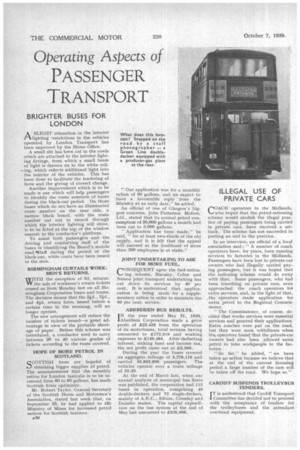Operating Aspects of
Page 32

If you've noticed an error in this article please click here to report it so we can fix it.
PASSENGER TRANSPORT
BRIGHTER BUSES FOR LONDON
A SLIGHT relaxation in the interior rklighting -estrictions in the vehicles operated by London Transport has been approved by the Home Office.
A small slit has been cut in the cowls which are attached to the interior lighting fittings, from which a small beam of light is thrown on to the white ceil ,ing, which reflects additional light into the interior of the vehicles. This has been done to facilitate the tendering of fares and the giving of correct change. Another improvement which is to be made is one which will help passengers to identify the route numbers of buses during the black-out period. On those buses which do not have an illuminated route number on the near side, a narrow black board, with the route number cut out in stencil through which the interior lighting will shine, is to be fitted at the 'top_ of the window nearest to the conductor's platform.
To assist both pa§sengers and the driving and conducting staff of the buses in identifying the Board's mobile road 'tau during the period of the black-out, white coats have been issued to the men.
BIRMINGHAM CURTAILS WORKMEN'S RETURNS.
WITH the exception of 5d. returns, VV the sale of workmen's return tickets ceased as from Monday last on all Birmingham Corporation buses and trams. The decision means that the Sid., 31d., and 41d. return fares, issued before a certain time in the morning, will no longer operate.
The new arrangement will reduce the number of tickets issued—a great advantage in view of the probable shortage of paper. Before this scheme was introduced, a conductor used to carry between 20 to 40 various grades of tickets according to the route covered.
HOPE OF MORE PETROL IN SCOTLAND.
SCOTTISH firms are hopeful of obtaining bigger supplies of petrol. The announcement that the monthly ration for London taxicabs is to be increased from 60 to 90 gallons, has made Scottish firms optimistic.
Mr. Robert Taylor, General Secretary of the Scottish Horse and Motormen's Association, stated last week. that, on September 25, he had applied to tffe Ministry of Mines for increased petrol rations for Scottish taximen.
A30 "Our application was for a monthly ration of 80 gallons, and we expect to • have a favourable reply from the Ministry at an early date," he added. An official of one of Glasgow's 'biggest concerns, John Patterson Motors, Ltd., stated that its normal petrol consumption of 20,000 gallons a month had been cut to 3,000 gallons.
" Application has been made," he said, " for at least two-thirds of the old supply, and it is felt that the appeal will succeed as the livelihood of more than 300 employees is at stake."
JOINT UNDERTAKING TO ASK FOR MORE FUEL.
rONSEQUENT upon the fuel-ration ing scheme, Burnley, Caine and Nelson joint transport undertaking has cut down its services by 40 per cent. It is understood that applicacation is being made for a supplementary ration in order to maintain the 60 per cent. service.
ABERDEEN BUS RESULTS.
I N the year ended May 31, 1939, Aberdeen Corporation made a gross profit of £23,435 from the operation of its motorbuses, total revenue having amounted to £172,919 and working expenses to £149,484. After deducting interest, sinking fund and income tax, the net profit came out at £2,260.
During the year the buses covered an aggregate mileage of 3,776,110 and carried 35,853,896 passengers. The vehicles operate over a route mileage of 23.33.
At the end of March last, when our annual analysis of municipal bus fleets was published, the corporation had 112 buses in operation, comprising 40 double-deckers and 72 single-deckers, mainly of A.E.C., Albion, Crossley and Daimler makes_ The capital expenditure on the bus system at the end of May last amounted to £235,906.
ILLEGAL USE OF PRIVATE CARS
COACH operators in the Midlands, who hoped that the petrol-rationing scheme would abolish the illegal practice of paying passengers being carried in private cars, have received a setback. The scheme has not succeeded in putting an end to the practice.
In an interview; an official of a local association said : "A number of coach operators have, for years, been running services to factories in the Midlands. Passengers have been lost to private-car owners who had illegally carried paying passengers, but it was hoped that the rationing scheme would do away with that. Some passengers, who had been travelling on private cars, even approached the coach operators for extra services, and, in the light of that, ,the operators made application for extra petrol to the Regional Commissioner.
"The Commissioner, of course, decided that works services were essential services and granted their applications. Extra coaches were put on the road, but they were soon withdrawn when the operators found that the private-tar owners had also been allowed extra petrol to take workpeople to the factories.
" So far," he added, "we have taken no action because we believe that at the end of the current licensing period a large number of the cars will be taken off the road. We hope so."
CARDIFF SUSPENDS TROLLEYBUS TENDERS.
I T is understood that Cardiff Transport Committee has decided not to proceed with the acceptance of tenders for. the trolleybuses and the attendant overhead equipment.




















































